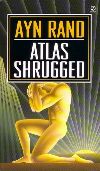
“Read the news today? It’s like ‘Atlas Shrugged’ is happening in real life,” as this Facebook group points out.
Many intelligent observers have noted the connection, which has led to sharply increased sales of Atlas and prominent coverage of Atlas‘s themes in Business Week, Forbes, the New York Times, the Economist, The Wall Street Journal, and other major publications. And from across the pond comes this British magazine’s tribute and commentary on Ayn Rand’s significance. (Thanks to Bob H. for the link.)
Amity Shlaes’s recent piece in Bloomberg is well worth reading: Atlas Is Shrugging With a Growing Load. Shlaes is the author of a recent history of the Great Depression and so is well positioned to offer commentary on our times. A pair of key quotations from Shlaes’s piece:
On punitive taxation: “In 1986, a year when Atlas Shrugged sold between 60,000 and 80,000 copies, the top 1 percent of earners paid 26 percent of the income tax. By 2000, that 1 percent was paying 37 percent, and Atlas Shrugged sales were at 120,000. By 2006, the top 1 percent carried 40 percent of the burden.”
On government fiat money and deficit financing, quoting Rand: “Paper is a mortgage on wealth that does not exist, backed by a gun aimed at those who are expected to produce it. Paper is a check drawn by legal looters upon an account which is not theirs: upon the virtue of the victims. Watch for the day when it bounces, marked, ‘Account overdrawn.’”
Today’s events are a consequence of political, economic, and, more importantly, philosophical principles adopted by the most influential thinkers and doers of the last several generations. The antidote, accordingly, requires that this and the next generation’s most influential thinkers and doers change their philosophical course.
For follow-up material on Rand’s philosophical analysis of the roots of the crisis and the antidote, I recommend the following.

For general readers, here is my introductory overview of Ayn Rand’s biography and ethics at the Internet Encyclopedia of Philosophy.
For all readers, here are two recent anthologies of essays on Atlas Shrugged, one edited by Professor Edward Younkins and the other edited by Professor Robert Mayhew.
For a technical, book-length discussion of Rand’s ethical theory, here is Tara Smith’s Ayn Rand’s Normative Ethics. For further discussion of Professor Smith’s book, here is my review [pdf], published in Philosophy in Review, and Carrie Ann Biondi’s extended review [pdf], published in the most recent issue of Reason Papers.

For a philosophically-informed analysis of the crisis by a top-level financial professional, I recommend John Allison’s analysis. Allison is Chairman of BB&T and one of the great businessmen of our generation. Evidence: BB&T is one of the major banks that is still very healthy. Like Todd Zywicki, I recently heard Allison speak on the origins of the financial crisis and how BB&T avoided being sucked into the mess, and I recommend his analysis highly.

As we are suffering through yet another hard experiential lesson about collectivism and enforced altruism, let’s resolve to learn the lesson clearly and in principle so that the next generation will see more encouraging signs like these.
Ayn Rand’s political economy is grand, what a shame that her epistemology is such a mess. Consequently she has generated a cult following instead of promoting the kind of critical rationalism that would generate a climate of deabte where people who think differently might be persuaded to change their minds.
Rafe, could you be more specific about why you think her epistemology is such a “mess?”
Thanks Bob, I can try! She has an authoritarian or “manifest truth” epiostemology. “The validity of the senses, she held, is axiomatic: sense-perception, being physiologically determined, cannot make “mistakes” or err in responding to the facts of reality.” (Wik). Consequently there is no allowance for the conjectural nature of knowledge and the way that manifest truth theories can lead to dogmatism, intolerence and the cult mentality. for an alternative approach, see Popper’s critique of the authoritarian structure of western philosophy. I think that is the appropriate epistemology for libertarians. http://www.the-rathouse.com/CRIntroductionSources.html
Hi Rafe. Thanks for your response. From the fact that the validity of the senses is axiomatic, it does not follow that no mistakes can be made, and I am not aware of any claim that Rand made to that effect. In fact, she held that people are fallible and that this was due to the nature of “conceptual consciousness.” That allows plenty of room for “the conjectural nature of knowledge.”
The dogmatism, intolerence, and cult mentality you refer to does not come from her metaphysics or epistemology. Rather it comes from a mistake in ethics. People with “evil ideas” are said to be evil people. David Kelley came up against this when he spoke before a group of Libertarians. Peikoff accused him of “giving sanction” and “moral subjectivism.”
The problem is that no philosophy is so good that it cannot be misinterperted, misapplied, or distorted. There is no such thing as a philosophy that is so perfect that it will keep people from making mistakes.